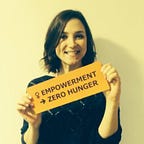Libyan artist raising awareness on gender-based violence: “You can change the world!”
Libyan artist Zahra Bibas works with the United Nations World Food Programme (WFP) to mark 16 Days of Activism against Gender-based Violence and shares her inspirational story of courage and unstoppable determination.
Zahra defines herself as an artist, no matter what. Though the path to train as one has not always been easy, she knows she can do anything.
When Zahra was six years old, her sister taught her how to draw. Despite long periods of health-related treatments and surgeries because of physical disabilities she was born with, she never gave up on her dream of being an artist. Her family supported her as she trained herself, first to draw with her feet and, later, with her mouth. It was her constant, and she took from realist, abstract and surreal techniques to create her own style of work.
“Everything I’ve achieved in my life is because of my family, who understood my needs and supported me every step of the way,” Zahra told WFP’s Mayssoun Chemila. “It was my family who urged me to work on my drawing skills between surgeries, and they supported my dream to get a university degree.”
Zahra now holds a degree from the University of Tripoli’s Faculty of Arts and Media.
This year, WFP asked Zahra if she would produce a painting marking 16 Days of Activism against Gender-based Violence, a yearly global call to action. Traditionally, the days are marked by the usage of the color orange, though the true importance lies in the message behind this color: a reminder to fight against all forms of violence, and that a world of safety, opportunity and equality for everyone is the standard we must not just strive for, but adhere to.
Zahra created a beautiful painting in her signature style.
“I am happy to partner with WFP, because I think WFP’s work in Libya is really important, especially the training programmes,” Zahra said.
Working with local partners, WFP in Libya implements vocational courses geared toward the empowerment and resilience of women and young people through trainings that combine locally marketable skills with people’s interests. The courses also support with supplies to help people set up their own business or find work.
“I love this approach because it builds people’s capacity, and gives them a chance to work and to improve their lives. That’s what I believe in, because it has happened to me: when you are given even a small push when it’s needed, you can change the world.”
Today, Zahra focuses on her art and at the same time works on her Master’s degree , after which she plans to pursue a PhD. She hopes, she says, for peace for her country, and for opportunity for everyone. “I want to show people that they can do anything — and that I can, too!”
WFP supports an average of 100,000 food-insecure and vulnerable people in Libya each month through a combination of modalities that provide both direct food assistance and support empowerment and community-building. The operation recently graduated from WFP’s Gender Transformation Programme (GTP), which “translates the concept of gender mainstreaming into a set of actions that advance gender equality through leadership, accountability requirements, programme design, partnerships and working conditions.”
